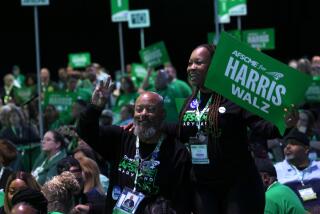Poll Finds West Wants More Federal Social Programs
- Share via
WASHINGTON — Democratic presidential nominee Michael S. Dukakis holds a substantial lead over Vice President George Bush in almost every region of the country, including the West, where usually anti-government voters favor increased federal action on health care and other social concerns, according to a Gallup Poll.
The survey, conducted for Times Mirror Co. from mid-May through July, found Bush, the presumed Republican nominee, trailing Dukakis by at least 10 percentage points in every region of the nation except the Southeast, where Dukakis’ lead was 3 points.
‘Surprise’ in West
Andrew Kohut, president of Gallup, said the regional figures show “much less variability than you would like to see if you’re a Republican.” The West, where Dukakis led 49% to 39%, “is where we see the greatest surprise,” Kohut said.
In a surprising shift, voters in 13 Western states expressed a stronger dissatisfaction with the direction of the country than voters elsewhere and rivaled Easterners in their desire for governmental initiatives to provide services such as medical care and shelter for the homeless.
Although Reagan won the West handily in the last two elections, the survey found his approval rating at 46%, doubtless contributing to Bush’s problems in the region.
In California, the survey found Reagan’s approval rate at 50%, but Dukakis led Bush there by 50% to 41%.
When asked whether they were “satisfied or dissatisfied with the way things are going” in the country, 57% of Westerners said they were dissatisfied, compared to 54% of all people surveyed.
Polled on Social Concerns
The Westerners were presented 11 social concerns--including halting the smuggling of drugs into the United States, ensuring that everyone can read, providing jobs for all who want them and ensuring that every child can afford college--and asked whether they favored government action on them, even if it required new taxes.
Westerners were more likely than the rest of the country to favor government action in every case except one--protecting workers from sudden layoffs. Ironically, President Reagan, giving in to pressure from Bush and Democrats, Tuesday said that he would let a bill requiring companies to give workers 60 days’ notice of plant closings become law without his signature.
The change in Westerners’ attitude toward government and Democrats may be a cyclical phenomenon, said Lawrence C. Dodd, director of the American Politics Center at the University of Colorado. “There’s something to the idea that, after a sustained period of constraint (on social spending), people begin to see what they’ve been missing,” he said.
Southern Attitude Differs
In contrast to Westerners, voters in the 13 Southern states were far less likely than other Americans to approve of new government programs that might result in higher taxes.
“Compassion in the South is traditionally expressed through private means, such as church and the United Way,” said Harvey F. Kline, chairman of the political science department at the University of Alabama in Tuscaloosa.
The regional surveys, conducted between May 13 and July 24, are part of a continuing study commissioned by Times Mirror, which publishes the Los Angeles Times and owns other newspapers, magazines and broadcasting stations.
The original study, published in June, included hourlong interviews with 3,021 adult voters. The updated report is based on 8,421 interviews. The margin of error for questions involving the entire group in the survey is plus or minus 3 percentage points and rises to 6 points for smaller regional samples.
More to Read
Get the L.A. Times Politics newsletter
Deeply reported insights into legislation, politics and policy from Sacramento, Washington and beyond. In your inbox twice per week.
You may occasionally receive promotional content from the Los Angeles Times.










